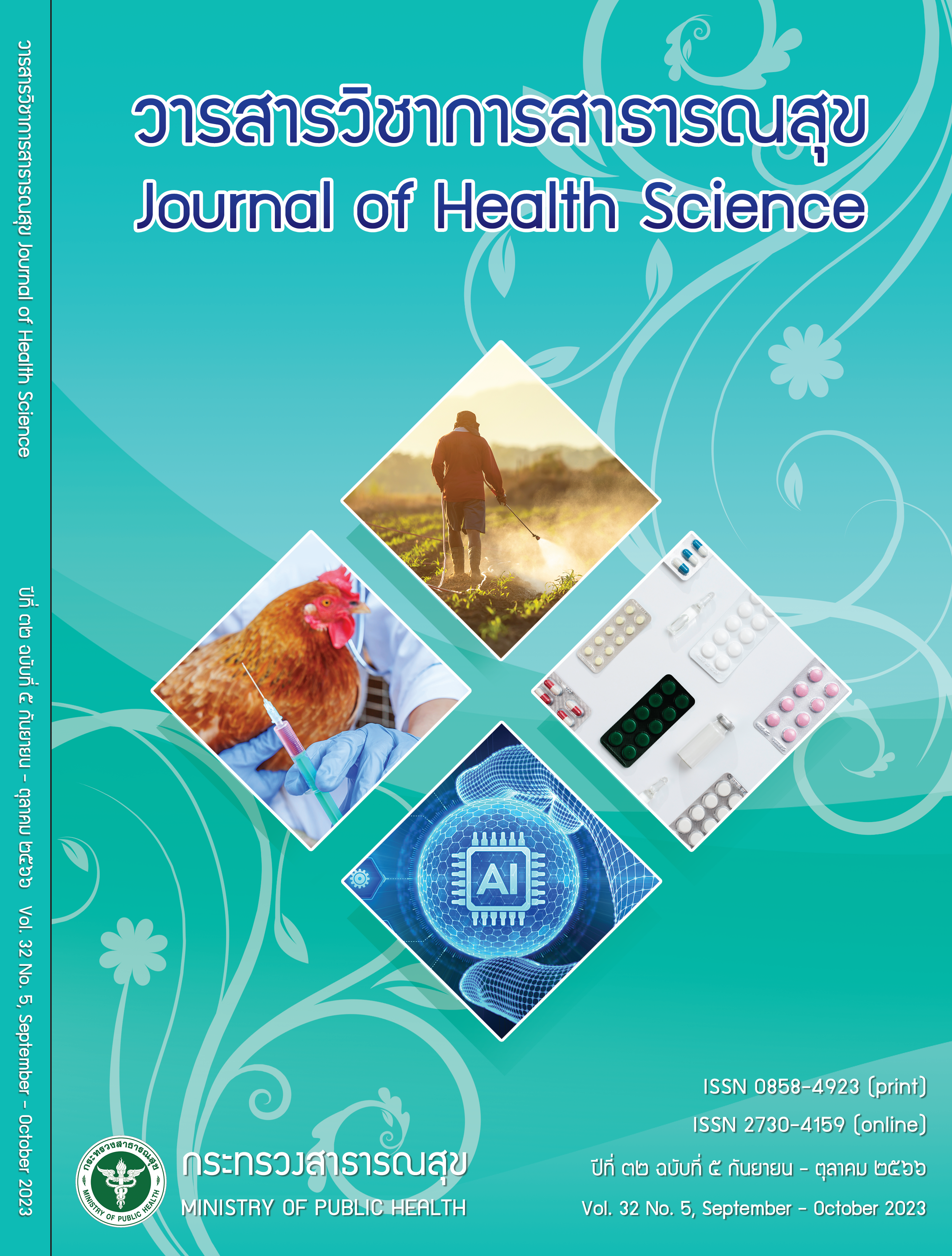Effectiveness of Speech and Language Rehabilitation for Stroke Patients with Aphasia at Sirindhorn National Medical Rehabilitation Institute
Keywords:
aphasia, stroke, speech therapyAbstract
The objectives of this research were to study the effectiveness of therapeutic progress in strokerelated Aphasic patients, and to review its prognosis for each speech and language skills. This prospective study used speech therapy notes in medical records from both out-patients and in-patients, and the Hospital Information System. Scores from intake session and after at least 3 months period using standardized test (Thai adaptation of Western Aphasia Battery test). The data were analyzed using descriptive statistics, independent T-test and post hoc analysis. The results showed that there were 25 participants comprised of 17 males (68%) and 8 females (32%). Average age was at 63.44 years old, with the range of 46 and 77 years old (SD=9.12). The mean scores for pre-intervention in fluency, comprehension, repetition, and naming skills were at 4.04 (SD=2.60), 4.79 (SD=3.10), 6.2 (SD=3.08), and 4.15 (SD=3.02) respectively, while the scores for post-intervention in the aforementioned skills were at 5.08 (SD=2.36), 6.13 (SD=2.69), 7.69 (SD=2.30), and 5.63 (SD=2.71), respectively. The mean differences in assessment scores among participants who received therapy in 3 months period (n=3) were at 2.66 (SD=1.52), 4.73 (SD=4.30), 4.10 (SD=3.96), and 2.93 (SD=2.65) in fluency, comprehension, repetition, and naming skills, respectively, while mean differences in assessment scores from participants receiving therapy more than 3 months period (n=22) in aforementioned skills were at 0.81 (SD=1.43), 0.87 (SD=1.32), 1.13 (SD=1.60) and 1.31 (SD=1.88). In conclusion, the mean scores for pre-intervention in all participants were lower than post-intervention in all skills, reflecting the recovery and improved conditions. Statistically, the mean differences of evaluation scores among participants who received therapy within 3 months period and exceeded 3 months were also significantly different in fluency, comprehension, and repetition skills. However, no significant differences were observed in naming skills. Consequently, impairment in naming skills remained common among aphasic patients, resulting in dysfluency and word finding difficulty. Speech therapists should be aware of this particular problem to efficiently establish intervention for patients to communicate effectively and efficiency.
Downloads
References
จันทร์ชัย เจรียงประเสริฐ. การฝึกพูดสำหรับผู้ป่วยโรคหลอดเลือดสมองที่มีปัญหาด้านการพูด. วิชัยยุทธจุลสาร 2548; 32:35-43.
รจนา ทรรทรานนท์, ชนัตถ์ อาคมานนท์, สุมาลี ดีจงกิจ. ความผิดปกติทางการพูด. กรุงเทพมหานคร: เรือนแก้วการ พิมพ์; 2529.
วรวรรณ ธีระพงษ์. เปรียบเทียบความสามารถทางภาษาของผู้ป่วยไทยอะเฟเซียกับคนไทยปกติโดยใช้ แบบทดสอบ Thai adaptation of Western Aphasia Battery [วิทยานิพนธ์ศิลปศาสตรมหาบัณฑิต]. กรุงเทพมหานคร: มหาวิทยาลัยมหิดล; 2543.
Ferro JM, Kertesz A. Comparative classification of aphasic disorders. Journal of clinical and experimental Neuropsychology 1987;9(4):365-75.
American Speech-Language-Hearing Association. Aphasia [Internet]. 2016 [cited 2021 Nov 15]. Availablefrom: https://www.asha.org/Practice-Portal/Clinical-Topics/Aphasia/.
สมจิต รวมสุข, อมรรัตน์ งามศรี. ค่าคะแนนความสามารถ ทางภาษาและการพูดในคนไทยปกติช่วงอายุ 15-24 ปี โดยใช้แบบทดสอบ WAB ฉบับภาษาไทย. วารสารกรมการแพทย์ 2558;40(3):66-79.
สถาบันสิรินธรเพื่อการฟื้ นฟูสมรรถภาพทางการแพทย์แห่งชาติ. รายงานประจำปี สถาบันสิรินธรเพื่อการฟื้นฟู สมรรถภาพทางการแพทย์แห่งชาติ. ปี งบประมาณ 2563. นนทบุรี: กรมการแพทย์;2563.
สถาบันสิรินธรเพื่อการฟื้นฟูสมรรถภาพทางการแพทย์แห่งชาติ. รายงานประจำปี สถาบันสิรินธรเพื่อการฟื้นฟูสมรรถภาพทางการแพทย์แห่งชาติ. ปี งบประมาณ 2564. นนทบุรี: กรมการแพทย์;2564.
กระทรวงสาธารณสุข. คู่มือการวินิจฉัยและตรวจประเมินความพิการ ตามประกาศกระทรวงการพัฒนาสังคมและความมั่นคงของมนุษย์ เรื่อง ประเภทและหลักเกณฑ์ความพิการ (ฉบับที่ 2) พ.ศ. 2555. กรุงเทพมหานคร: กรมส่งเสริมและพัฒนาคุณภาพชีวิตคนพิการ; 2555.
Pashek GV, Holland AL. Evolution of aphasia in the first-year post-onset [Internet]. 1988 [cited 2021 Nov 18]. Available from: https://pubmed.ncbi.nlm.nih. gov/3191724/
Jiaranai T, Jeeraumporn J, Dechongkit S, Tiensuwan M. Outcomes of speech and language abilities and quality of life in thai people with aphasia by group therapy. Journal of Health science and Medical Research 2019;37(2):133- 44.
Papathanasiou I, Coppens P, Constantin P. Aphasia and related neurogenic communication disorders. Burlington: Jones & Bartlett Learning Publishers; 2011.
Downloads
Published
How to Cite
Issue
Section
License

This work is licensed under a Creative Commons Attribution-NonCommercial-NoDerivatives 4.0 International License.







